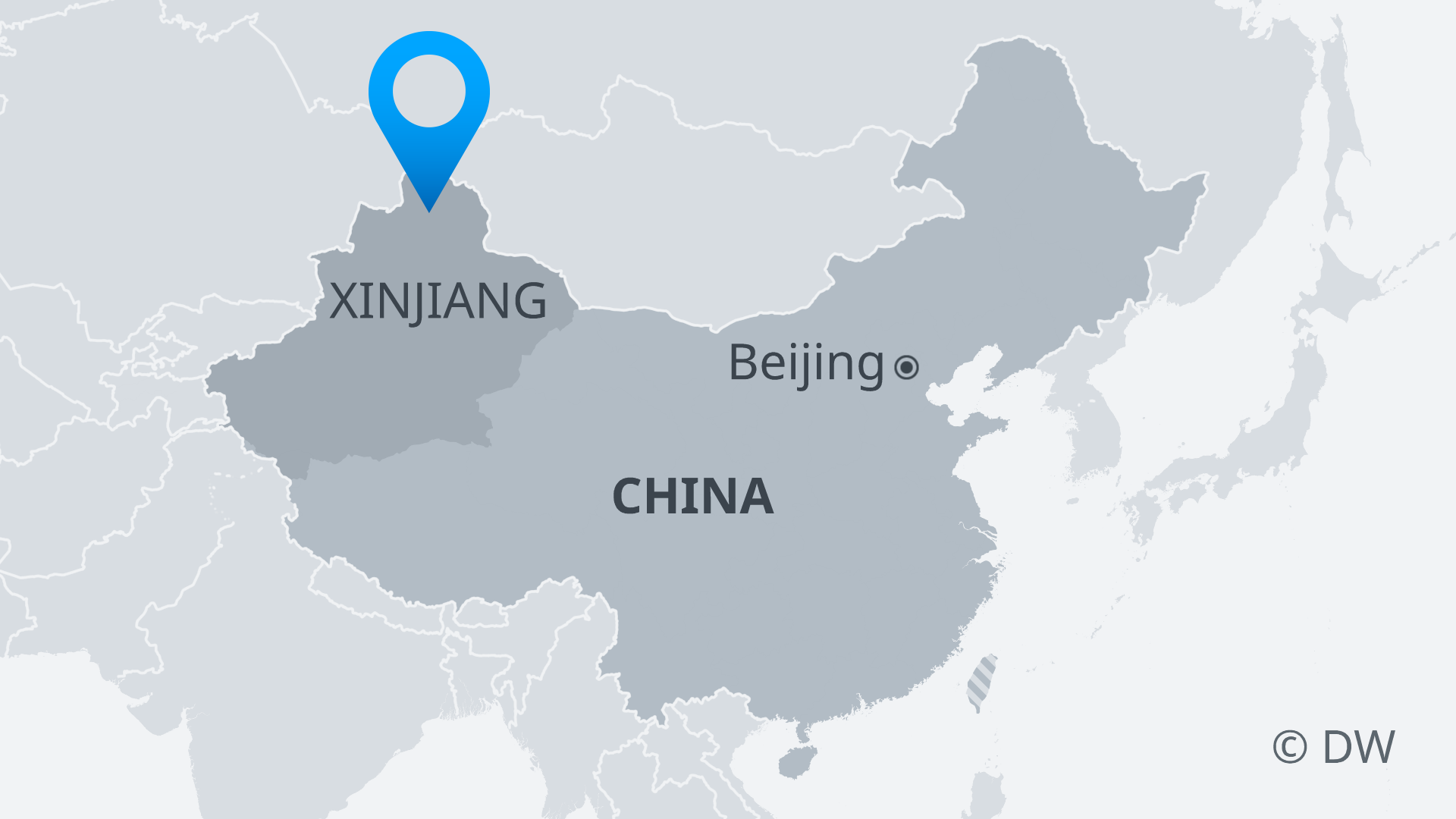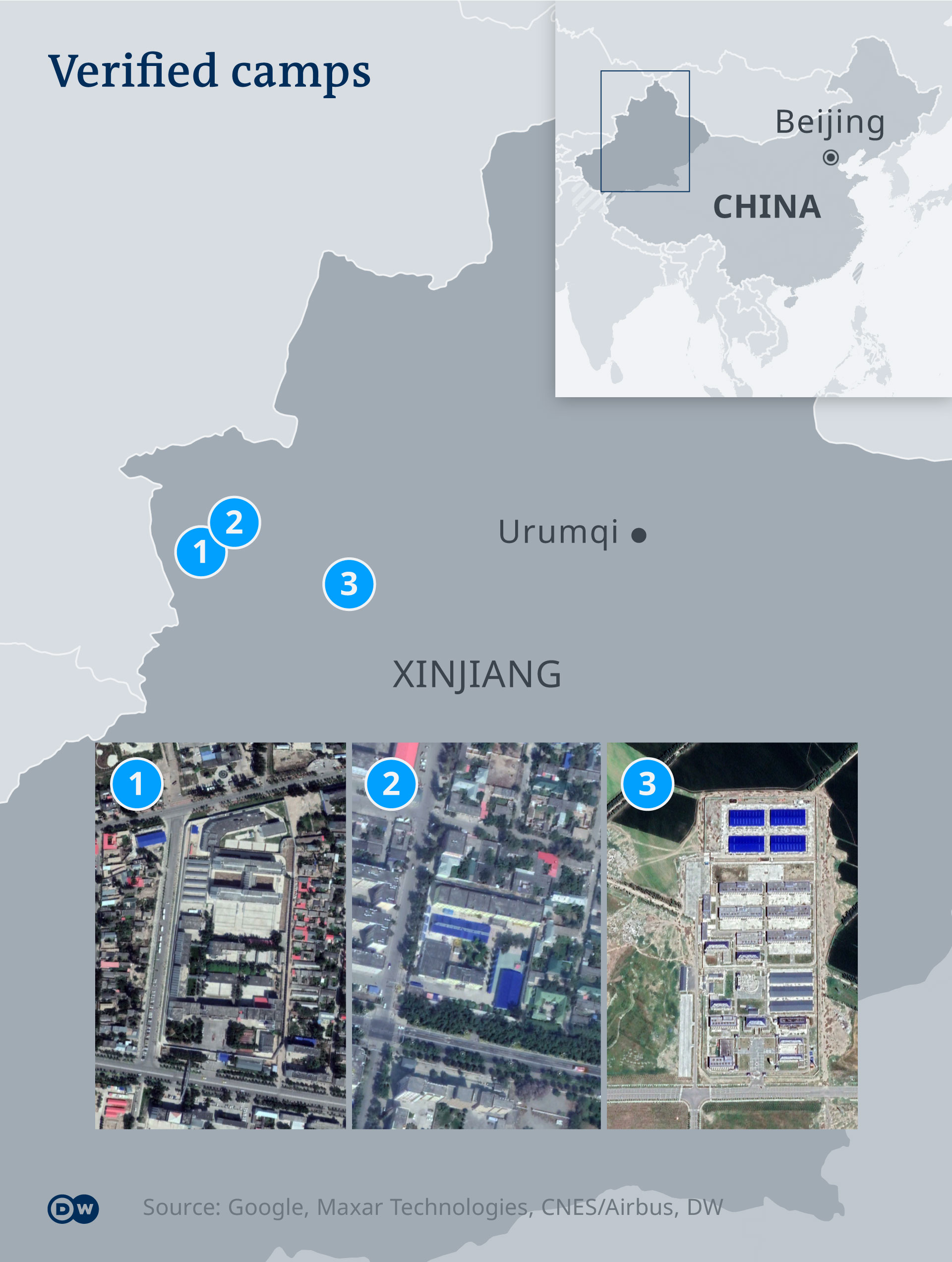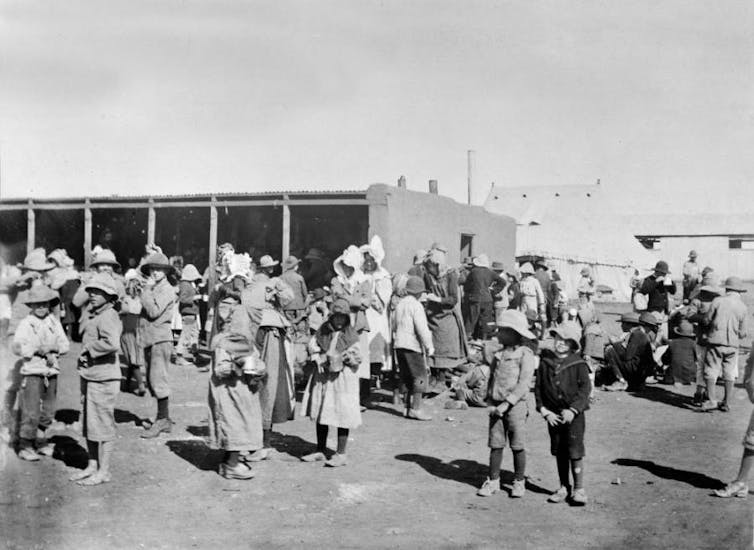ProPublica is a Pulitzer Prize-winning investigative newsroom. Sign up for The Big Story newsletter to receive stories like this one in your inbox.
Recently, the owner of a small store in western China came across some remarks by Mike Pompeo, the former U.S. secretary of state. What he heard made him angry.
A worker in a textile company had the same reaction. So did a retiree in her 80s. And a taxi driver.
Pompeo had routinely accused China of committing human rights abuses in the Xinjiang region, and these four people made videos to express their outrage. They did so in oddly similar ways.
“Pompeo said that we Uighurs are locked up and have no freedom,” the store owner said.
“There’s nothing like that at all in our Xinjiang,” said the taxi driver.
“We are very free,” the retiree said.
“We are very free now,” the store owner said.
“We are very, very free here,” the taxi driver said.
“Our lives are very happy and very free now,” the textile company worker said.
These and thousands of other videos are meant to look like unfiltered glimpses of life in Xinjiang, the western Chinese region where the Communist Party has carried out repressive policies against Uighurs and other predominantly Muslim ethnic minorities.
Most of the clips carry no logos or other signs that they are official propaganda.
But taken together, the videos begin to reveal clues of broader coordination — such as the English subtitles in clips posted to YouTube and other Western platforms.

Uighur Muslim worshipers attend an early afternoon prayer session at the Kashgar Idgah mosque in Xinjiang province. Photo taken August 5, 2008 Photo: Nir Elias/Reuters
A monthslong analysis of more than 3,000 of the videos by ProPublica and The New York Times found evidence of an influence campaign orchestrated by the Chinese government.
The operation has produced and spread thousands of videos in which Chinese citizens deny abuses against their own communities and scold foreign officials and multinational corporations who dare question the Chinese government’s human rights record in Xinjiang.
It all amounts to one of China’s most elaborate efforts to shape global opinion.
Beijing is trying to use savvier and more forceful methods to broadcast its political messages to a worldwide audience. And Western internet platforms like Twitter and YouTube are playing a key part.
Many of these videos of people in Xinjiang first appeared on a regional Communist Party news app. Then they showed up on YouTube and other global sites, with English subtitles added. (The excerpts of dialogue in this article are translated from the original spoken Chinese or Uighur by ProPublica and The Times. They are not taken from the English subtitles in the original videos.)
On Twitter, a network of connected accounts shared the videos in ways that seemed designed to avoid the platform’s systems for detecting influence campaigns.
China’s increasingly social-media-fluent diplomats and state-run news outlets have since spread the testimonials to audiences of millions worldwide.
Western platforms like Twitter and YouTube are banned in China out of fear they might be used to spread political messaging — which is exactly how Chinese officials are using these platforms in the rest of the world.
They are, in essence, high-speed propaganda pipelines for Beijing. In just a few days, videos establishing the Communist Party’s version of reality can be shot, edited and amplified across the global internet.
How the Videos Work
The dialogue in hundreds of the Xinjiang videos contains strikingly similar, and often identical, phrases and structures.
Most videos are in Chinese or Uighur and follow the same basic script. The subject introduces themselves, then explains how their own happy, prosperous life means there couldn’t possibly be repressive policies in Xinjiang.
Here’s a typical clip, shot as a selfie.
A four-character Chinese phrase meaning “born and raised” appears in more than 280 of the more than 2,000 videos attacking Pompeo that ProPublica and the Times found on YouTube and Twitter.

The locked door of a neighbourhood mosque is seen in Kashgar, Xinjiang Uighur autonomous region, China, March 23, 2017. Credit: Reuters
The people in more than 1,000 of the videos say they have recently come across Pompeo’s remarks, most of them “on the internet” or on specific platforms such as Douyin, the Chinese version of TikTok.
An expression meaning “complete nonsense” and close variations of it appear in more than 600 of the videos.
Establishing that government officials had a hand in making these testimonials is sometimes just a matter of asking.
In one clip, the owner of a used car dealership in Xinjiang says: “Pompeo, shut your mouth.”
When reached by phone, the man said local propaganda authorities had produced the clip. When asked for details, he gave the number of an official he called Mr. He, saying, “Why don’t you ask the head of the propaganda department?”
Multiple calls to Mr. He’s number were not answered. Seven other people in the videos whose contact information could be found either declined to be interviewed or couldn’t be reached. (The name of the car dealership’s owner is being withheld to protect him from retribution by Chinese officials.)
In another sign of government coordination, language in the videos echoes written denunciations of Pompeo that Chinese state agencies issued around the same time.
Beginning in late January, government workers across Xinjiang held meetings to “speak out and show the sword” against “Pompeo’s anti-China lies,” according to statements on official websites.
The clips’ effectiveness as propaganda comes in part because they will probably be most people’s only glimpse into Xinjiang, a remote desert region closer to Kabul than to Beijing.
The Chinese authorities have thwarted efforts by journalists and others to gain unfettered access to the indoctrination camps where hundreds of thousands of Muslims have been sent for reeducation.
On government-led tours of the region, foreign diplomats and reporters have been allowed to speak with locals only under Chinese officials’ watchful eyes, often in settings that seem staged and scripted.
For Western platforms hosting the Xinjiang testimonials, the fact that they are not immediately obvious as state propaganda poses a challenge.
To promote transparency, sites like YouTube and Twitter label accounts and posts that are associated with governments. The Xinjiang videos, however, carry no such tags.
YouTube said the clips did not violate its community guidelines. Twitter declined to comment on the videos, adding that it routinely releases data on campaigns that it can “reliably attribute to state-linked activity.”
How the Videos Spread
The video campaign started this year after the State Department declared on Jan. 19, the final full day of the Trump presidency, that China was committing genocide in Xinjiang.
“I’ve referred to this over time as the stain of the century — it is truly that,” Pompeo said.

An ethnic Uighur man talks on the phone in front of the Id Kah Mosque in the old town of Kashgar, Xinjiang Uighur autonomous region, China, March 22, 2017. Photo: Reuters
Within days, videos criticising Pompeo began appearing on an app called Pomegranate Cloud, which is owned by the regional arm of the official Communist Party newspaper, People’s Daily. The name of the app is a reference to a propaganda slogan that calls on people of all ethnic groups in China to be as closely united as pomegranate seeds.
From there, the videos often jumped onto other Chinese platforms before making their way onto global social media sites like Twitter and YouTube.
On Twitter, ProPublica and The Times found, the clips were shared by more than 300 accounts whose posts strongly suggested they were no ordinary users. The accounts often posted messages that were identical but for a random string of characters at the end with no obvious meaning, either four Roman letters, five Chinese characters or three symbols such as percentage signs or parentheses.
Such strings were found in about three-quarters of the accounts’ tweets. They caused the text of the posts to vary slightly, in an apparent attempt to bypass Twitter’s automated anti-spam filters.
There were other signs that the Twitter accounts were part of a coordinated operation.
All of the accounts had been registered only in recent months. Many of them followed zero other users. Nearly all had fewer than five followers. The bulk of their tweeting took place between 10 a.m. and 8 p.m. Beijing time.
The text of several of the accounts’ tweets contained traces of computer code, indicating that they had been posted, sloppily, by software.
Twitter suspended many of these accounts in March and April, before ProPublica and The Times inquired about them. Twitter said the accounts had violated its policies against platform manipulation and spam.
The accounts did not upload Xinjiang clips directly to Twitter. Rather, they tweeted links to videos on YouTube or retweeted videos that had been originally posted by other Twitter accounts.
Those YouTube and Twitter accounts often posted copies of the same Xinjiang videos at roughly the same time, according to analysis by ProPublica and The Times. Nearly three-quarters of the copied clips were posted by different accounts within 30 minutes of one another. This suggests the posts were coordinated, even though the accounts had no obvious connection.
Most of these accounts — seven on Twitter and nearly two dozen on YouTube — posted dozens of videos that originally appeared on Pomegranate Cloud. The accounts seem to have served solely as warehouses to store the clips, making it easier for other accounts in the network to share them.

An ethnic Uighur demonstrator wears a mask as she attends a protest against China in front of the Chinese Consulate in Istanbul, Turkey, October 1, 2019. Photo: Reuters/Huseyin Aldemir
How the Campaign Is Evolving
The effort continues to evolve. In some cases, state media and government officials have begun to openly spread the clips attacking Pompeo. Other videos have found new issues and people to target.
In one clip, a woman denies accusations of forced labor. “I have five greenhouses, and no one forces me to work,” she says.
She turns the camera toward several other women behind her.
“Friends, is anyone forcing you to work?” she asks. “No!” they cry in unison.
The clip was posted by Global Times, a state-controlled newspaper, on the Chinese platform Kuaishou on Jan. 25. Two days later, the video was posted on Twitter and YouTube by the warehouse accounts within 30 minutes of one another. Just over a week later, two representatives for China’s Ministry of Foreign Affairs posted the clip on Twitter as well.
The ministry did not respond to a faxed request for comment, nor did the Xinjiang offices of the Communist Party propaganda department.
Two months later, another wave of videos, shot in the same style and distributed in a similar way, raged against H&M and other international clothing brands that have expressed concern about possible labor abuses in Xinjiang’s cotton and textile industries.
In one video, a Uighurs woman sits on a couch with her husband and young son.
“Mom, what’s H&M?” the boy asks.
“H&M is a foreign company that uses our Xinjiang cotton and speaks ill of our Xinjiang,” she says. “Tell me, is H&M bad or what?”
“Very bad,” the boy says stiffly.
The clip was posted on Pomegranate Cloud on March 29. Six days later, it was posted on Twitter and YouTube, 20 minutes apart, by two warehouse accounts. As with all of the other clips that appeared on those platforms, English subtitles were added somewhere along the way, seemingly for the benefit of international audiences.
The anti-H&M campaign continues. By June 21, more than 800 cotton-related videos had been posted to Pomegranate Cloud, a large share of which were later reposted on YouTube or Twitter.
New videos are being uploaded to Pomegranate Cloud nearly every day. That means the campaign, which has already enlisted thousands of people in Xinjiang — teachers, shopkeepers, farmhands — could keep growing.
The audience outside China for the videos could also keep expanding.
The warehouse accounts on YouTube have attracted more than 480,000 views in total. People on YouTube, TikTok and other platforms have cited the testimonials to argue that all is well in Xinjiang — and received hundreds of thousands of additional views.
In a phone interview, Pompeo said friends, and occasionally his son, had come across the Xinjiang testimonials online and sent them to him.
As clumsy as the videos seem, he said, their influence should not be dismissed: “In places that don’t have access to a great deal of media, that repetition, those storylines have an ability to take hold.”
China’s propaganda efforts will keep getting better, Pompeo added. “They’ll continue to revise and become quicker, more authentic in their capacity to deliver this message,” he said.

Workers walk by the perimeter fence of what is officially known as a vocational skills education centre in Dabancheng in Xinjiang Uighur Autonomous Region, China September 4, 2018. Photo: Reuters/Thomas Peter/File Photo
How the Videos Divided a Family
For one Uighur activist living in exile in the United States since 2005, the videos have had a more personal impact.
Several of the Xinjiang videos feature family members of Rebiya Kadeer, 74, whom the Chinese government has accused of abetting terrorism. In one clip, two of Kadeer’s granddaughters lash out at Pompeo while out shopping for a wedding.
“Grandma, I recently saw online that Pompeo’s making reckless claims and talking nonsense about our Xinjiang,” one granddaughter says. “I hope you won’t be fooled again by those bad foreigners.”
Kadeer said the videos were the first time she had heard her relatives’ voices in years.
“I have been crying in my heart about my children,” she said in a phone interview.
Kadeer said the videos had given her a chance to see what had become of her granddaughters. The last time she saw them, they were infants.
“Some people will believe these videos and believe Uighurs are living a happy life,” she said. “We can’t say they have locked up everyone. But what they’re saying in these videos — it’s not true. They know they’re not speaking the truth. But they have to say what the Chinese government wants them to say.”
This story was originally published on ProPublica.










